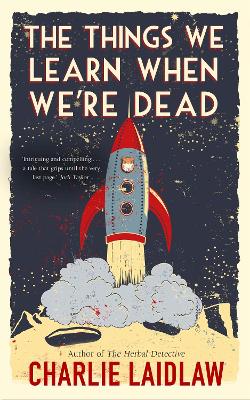4.5 stars. Friends, I devoured this 500 page book in like 3 working days. This is such a refreshing and unique read! Lorna Love has died and gone to heaven... or rather HVN, a spaceship infested with hamsters (do not feed them, ever) among the stars.
The Things We Learn When We're Dead is mostly a book about Lorna's life; HVN and the cast of characters she meets on that spaceship are secondary to the story. This is a fast paced, character-driven novel told by an omniscient narrator in two perspectives:
1. 'The present,' referring to the dead Lorna in heaven storylineThe narrator alternates between these two perspectives often and the flashbacks are presented in a non-linear fashion and the perspectives switched without warning. At times I did struggle to follow the timeline as I generally prefer a linear storytelling. While the jumps in time were always separated by asterisks, there isn't an indication of what time period (or if it is a memory at all). This was only a minor annoyance, though, because Laidlaw masterfully manages to have distinct voices depending on the time period -- memories from Lorna's childhood are told in a way that reads from that perspective, whereas the writing structure and language choices when she is older is different. The overall voice is consistent, but this nuanced way of noting the shift in time-frame was elegant and the way I was able to easily orient myself once I got acquainted with the writing style.
2. 'Flashbacks' (or memories) of Lorna's life and loved ones
"Many are taken, few are chosen."
After Lorna dies she wakes up to find herself in heaven... or rather, HVN -- an alien spaceship that has been essentially stranded near Earth for centuries after experiencing technical difficulties. Lorna finds out that she was regenerated on HVN after death and her memories were uploaded to the new body, only she doesn't remember much... yet.
"She'd been told that she was a temporal anomaly: dead in one place, alive in another. But Lorna didn't feel dead. She didn't feel devastated by her death, because she could no longer believe she had died. Equally, she didn't feel elated by continued life either. It was as if she had become two people, with different consciousnesses in different places; the real and nonsensical place in which she existed couldn't be death..."
The character development for Lorna's family and friends is done slowly through the non-sequential flashbacks as she regains her memory. Every single character felt real, they were relatable and multi-faceted. I cared for every single one of them.
"In Lorna's experience, her mother's barbecue sausages never turned brown, the way she sometimes saw on films or in adverts. One minute they were raw, the next cremated. There was no halfway stage at which burger or sausage could safely be eaten. They always came with a layer of charcoal."
We also learn a lot about Lorna through her regaining her memory... her moral code, her defensiveness at being thought stupid, wanting to appear knowledgeable and assured. Her idealism and wanting to make the world a better place. These traits reveal themselves as the layers of the onion of her personality are peeled back and I can relate to her so much. Lorna is a character that I believed her choices and actions -- as a matter of fact, I can say that about all of the characters; none were one dimensional.
I do wish that it had been clearer that the flashbacks were part of the overall HVN narrative; I think I realized that may be what was intended around 130 or so pages in but it wasn't confirmed until page 196.
While a lot of care is spent describing HVN and its inhabitants in the 'present', I did find the 'worldbuilding' during the flashbacks for Scotland a bit lacking. Edinburgh is a stunning city and there are such vast architectural differences between the Royal Mile area overlooking the castle and New Town; it is a shame that it wasn't expanded on a bit but that may just be my bias because I spent 4 weeks in Edinburgh during the summer of 2013. Page 205 mentions The Last Drop Pub, located in the Grassmarket, and I legit started laughing because I ate there a few times during my stay. As the book mentions, it is a historic pub where people used to be brought for their last drop of alcohol prior to their last drop (execution by hanging).
When I read a book I am usually afflicted with Synopsis Amnesia: I don't remember what the back cover said and I can truly read the book unspoiled. Sure, I read the synposes when I first decide to haul/TBR a book... it is just that for the most part by the time I pick it up I don't remember the details and prefer it that way. About midway through the book, for no logical explanation, I began trying to piece everything together based on the synopsis. Playing detective, searching for clues. And I think that may have been a bit to my detriment as it pulled me out of the fast paced, interesting and engaging narrative.
I highly recommend this book. It isn't science fiction, not really. It is a compelling and well written story about life, memory, and perception. The ending is open for interpretation, and I have my own theories but legit spoiler so don't click unless you have read the book the book was essentially the frame for her life flashing before her eyes as she died. Also if anyone figures out more about the hamsters please let me know.
Many thanks to Charlie Laidlaw for sending my a free copy of his book in exchange for my honest review.
Blog | Twitter
